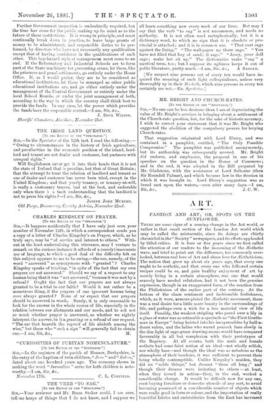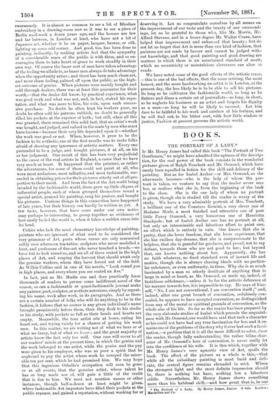ART.
FASHION AND ART; OR, SPOTS ON THE SUNFLOWER.
THERE are some signs of a coming change in the Art world, or rather in that small section of the London Art world which
may be called the aristocratic, since its doings are chiefly chronicled in the " Society " newspapers, and its efforts applauded by titled critics. It is four or five years since we first called the attention of our readers to the in-coming of the /Esthetic wave, and tried to point out the difference, too commonly over- looked, between real love of Art and sham love for /Estheticism. The notion that grew up about six years ago, that every one ought to be aesthetic, and that every one who followed certain recipes could be so, and gain healthy enjoyment of art by merely living in a certain atmosphere, was one that would scarcely have needed refutation, had it not been the genuine expression, though in an exaggerated form, of the reaction from the Philistinism of the earlier part of the century. At the bottom of the sham sentiment and fashionable foolishness, which, as it were, armour-plated the /Esthetic movement, there was a real desire for a little more beauty in the surroundings of life, and perhaps even a wish for a less material view of life itself. Possibly, the weakest stripling who pored over a lily- in a glass of water was as estimable a spectacle as "the First Gentle- man in Europe " being hoisted into his inexpressibles by half-a- dozen valets, and the ladies who waved peacock fans slowly in the dim light of sage-green drawing-rooms would have compared favourably in all but complexion with their prototypes of the Regency. At all events, both the male and female aesthete had some faint notion of an ideal—not wholly selfish, nor wholly base—and though the ideal was as nebulous as the atmosphere of their boudoirs, it was sufficient to prevent their being wholly contemptible. Unlike Kingsley's maiden, they did no " noble things," but dreamt " them all long ;" and though their dreams were irritating to others —at least, when they issued in action—they, in the end, worked a considerable change. It would be difficult now for any one, even buying furniture or domestic utensils of any sort, to avoid becoming possessed of a considerable number of objects which were really good in form or colour, and the importation of really beautiful fabrics and embroideries from the East has increased.
enormously. It is almost as common to see a bit of Rhodian embroidery in a drawing-room now as it was to see a piece of Berlin wool-work a dozen years ago, and the houses are few and far between, in London at least, who have not a bit of Japanese art, whether it be on paper, lacquer, bronze, or silk, lighting up some odd corner. And good, too, has been done to painting, indirectly, by making artists feel that the sympathy of a considerable mass of the public is with them, and so en- couraging them to take heart of grace to work steadily in their own way. Of course the baser sort of men have taken advantage of the feeling we allude to, as baser men always do take advantage when the opportunity arises ; and there has been much sham art, and more sham feeling, palmed off upon the public, as the high- est outcome of genius. When pictures were mainly bought and sold through dealers, there was at least this guarantee for their worth,—that the dealer did know, by practical experience, what was good work and what was not, and, in fact, staked his repu- tation, and what was more to him, his coin, upon each succes- sive purchase. No doubt he often kept his workers poor, no doubt be often sold his patrons rubbish, no doubt he generally filled his pockets at the expense of both ; but still, when all this was granted, there remained this solid fact, that an artist's work was bought, and judged, and valued in the main by men who must have known—because their very life depended upon it—whether the work was good or not. When, however, it grew to be the fashion to be aesthetic, one of the first results was to make folks afraid of showing any ignorance of artistic matters. Every one pretended to be a judge, and bought pictures, if at all, on his or her judgment. One result of this has been very prejudicial to the cause of the real artists in England, a cause that we have very much at heart. It happened that the painters, or rather the adventurers, for some of them could not paint at all, who were most audacious, most talkative, and most fashionable, suc- ceeded in obtaining prices for their pictures utterly out of all pro- portion to their merit. And from the fact of the Art world being invaded by the fashionable world, there grew up little cliques of influential people, each of whom grouped themselves round a special artist, praised his painting, sang his praises, and bought his pictures. Curious things in this connection have happened of late years, but their history can hardly be written as yet. A few facts, however, that have come under our own notice may perhaps be interesting, to group together as evidences of how easily fooled the world is, when it takes a sudden craze into its head.
Critics who lack the most elementary knowledge of painting, painters who are ignorant of what used to be considered the very grammar of Art, poets whose verses are only murmured softly over afternoon tea-tables, sculptors who never modelled a bust, and professors of fine-art who never touched a brush,—we have but to look round us, and see all of these seated in the high places of Art, and reaping the harvest that should await only the genuine workers, whom they have forced out of the field- As Wilkie Collins said in one of his novels, " Look round you in high places, and everywhere you see seated an Ass."
In fact, just as Mr. Mudie can and does practically force thousands of readers to peruse some indifferent novel of the season, so can a fashionable or quasi-fashionable journal make any painter, poet, sculptor, or aesthete notorious, simply by repeat- ing his name, week after week, in its paragraphs. And as there are a certain number of folks who will do anything to be in the fashion, it follows that no sooner is any given individual's name brought prominently before them, than they flock to his studio or his study, with pockets as full as their heads and hearts are empty. Meanwhile, the true artist sits at home, eating his heart out, and trying vainly for a chance of getting his work seen. In this matter, we are writing not of what we hear or of what we fancy, but of what we know ; and the great majority of artists know the fact only too well. One case will occur to all our readers' minds at the present time, in which the genius and the work belonged to one artist, while the praise and the pay were given to his employer, who was so poor a spirit that he neglected to pay the artist whose work he usurped the miser- able ten per cent. which he had promised him. We may hope that this ingenious Othello's occupation will soon be gone, or at all events, that the genuine artist, whose talent he has so long made use of, will gain a little of the credit that is due to him. We need not mention names or other instances, though half-a-dozen at least might be given, where fashionable Art impostors have filled their pockets at the public expense, and gained a reputation, without working for or deserving it. Let us congratulate ourselves by all means on the improvement of our taste and the beauty of our surround- ings, let us be grateful to those who, like Mr. Morris, Mr. Alfred Stevens, and in a lesser degree Mr. Walter Crane, have helped that improvement and enhanced that beauty ; but do not let us forget that Art is more than one kind of fashion, that painters are not made by favour and cannot be judged with- out knowledge, and that good painting and good drawing are matters in which there is an ascertained standard of merit, which no eccentricity or meretricious cleverness can alter or evade.
We have noted some of the good effects of the artistic craze, —this is one of the bad effects, that the more retiring, the more honest, and the more hardworking an artist is in London, at the present day, the less likely he is to be able to sell his pictures. So long as he cultivates the fashionable world, so long as he flatters and dines a certain set of journalists—so long, in short, as he neglects his business as an artist and forgets his dignity as a man—so long he will be likely to succeed. Let him dare to be faithful to his work and careless of his fortune, and he will find out, to his bitter cost, with how little wisdom or justice, Fashion at present governs the artistic world.



































 Previous page
Previous page